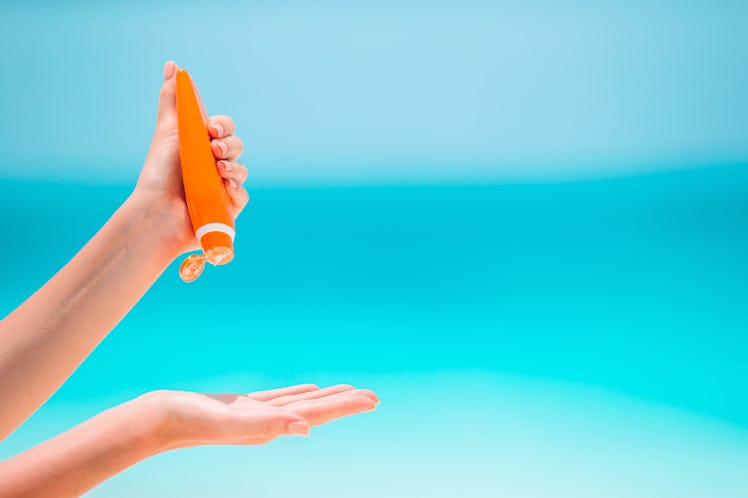
How To Check If Your Sunscreen Is Safe, According To A Dermatologist
Don’t let the recall keep you from applying (and reapplying) your SPF daily.
Following Johnson & Johnson’s July 14 voluntary recall of several aerosol sunscreens due to benzene contamination, consumers are taking a closer look at the ingredients in their sun protection. Although benzene is a carcinogen (and therefore not an ingredient in sunscreens), you might be wondering if your sunscreen is safe and if there are certain ingredients you should look out for. Here’s what you should keep in mind when purchasing an SPF product.
While the ingredients in sunscreen have recently come under scrutiny due to the Johnson & Johnson recall, the U.S. Food and Drug Administration (FDA) still recommends people wear sunscreen and practice other protective measures to mitigate the risk of skin cancer. Sunscreen is highly regulated: In 2019, the FDA announced updated requirements to better ensure the 16 approved sunscreen ingredients on its list are as safe and effective as possible.
According to a July 14 press release, Johnson & Johnson stated the recall of four Neutrogena and one Aveeno aerosol sunscreen products was done with the knowledge of the FDA, and the recall was due to an “abundance of caution” after low levels of benzene – a carcinogen associated with some blood cancers – were found in some samples of the sunscreen. The statement said the company is “investigating the cause of this issue, which is limited to certain aerosol sunscreen products.”
In a statement to Elite Daily, Johnson & Johnson said the “health and safety” of consumers is its “top priority.” The company also reiterated “daily exposure to benzene in these sunscreen products at the levels detected in our testing would not be expected to cause adverse health consequences.” The FDA also said in a statement to Elite Daily it “takes seriously any safety concerns raised about products we regulate, including sunscreens.” The agency added to Elite Daily that it’s currently in the process of “securing product samples and performing independent evaluation,” saying, “If FDA’s testing raises any safety concerns, we will work with manufacturers to address these concerns.”
What To Know About Benzene
Dr. Adam Friedman, MD, FAAD, professor and Chair of Dermatology at George Washington University’s School of Medicine & Health Sciences, tells Elite Daily because benzene is not an intentional additive to sunscreen (or any commercial product), you won’t be able to look for it on any ingredients lists.
“Sunscreens are regulated very tightly by the FDA, probably more so than even some drugs, which is one of the reasons why we have not seen a new sunscreen ingredient come out in over 20 years,” Friedman says. “Sunscreens are not only effective at protecting us from the harmful effects of the sun, but they are extraordinarily safe. The issue here is something got in that didn't belong.”
“Benzene is not a kind of breakdown or by-product of the sunscreen ingredient, which is called a UV filter, [or] part of the typical preservatives,” he says. “Instead, it’s likely that trace amounts of benzene contaminated the affected aerosol sunscreens as part of a manufacturing issue.”
Friedman reiterates that benzene contamination isn’t an issue unique to sunscreens. “Benzene is all around us — it’s in the environment, car exhaust, paint,” he says. Most of what’s known about benzene comes from people who are chronically exposed to it over time, usually in the workplace, Friedman explains, and he gives major “props” to Johnson & Johnson for their voluntary recall, saying, “They did not have to recall those.”
The July 14 Johnson & Johnson recall followed a May 2021 report from Valisure, a company that checks the chemical composition of medications, which found trace amounts of benzene (43 out of 224 sunscreens and 8 of 48 independently tested after-sun products) in some lotions, creams, and gels, in addition to aerosols. For a full list of affected sunscreen and after-sun products, take a look at Valisure’s findings. You can also see the full list of sunscreens not found to have levels of benzene during a sample test.
What To Look For In A Sunscreen
Despite the recalls, Friedman emphasizes the importance of wearing sunscreen to protect yourself from the sun and potential skin cancer. In the United States, more people are diagnosed with skin cancer every year than for all the other cancers combined, according to the American Cancer Society’s 2021 fact sheet.
He says there are a few key things to look out for to make sure your sunscreen is as effective as possible. In addition to recommending you wear a broad-spectrum sunscreen with SPF 30 or higher, Friedman notes your sunscreen label should say it’s water resistant for 80 minutes.
“For people with a more sensitive skin or a history of eczema, the mineral sunscreens with zinc oxide or titanium dioxide are probably more tolerable,” Friedman says, adding that zinc and titanium oxide are the safest approach if you’re highly cautious following the recall. While these sunscreens can leave your skin with a white hue, the FDA has approved these ingredients and has no concerns about their safety.
As you shop for sunscreen, he recommends checking out Valisure’s list of impacted products: “Maybe avoid aerosols for now, while we're figuring this all out, but there are plenty of sunscreen formulations that we know are safe and effective.”
Experts cited:
Dr. Adam Friedman, MD, FAAD, Professor and Chair of Dermatology at the George Washington University School of Medicine & Health Sciences
This article was originally published on